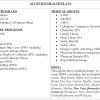Understanding the Link Between Obesity and Heart Disease
- The Impact of Obesity on Heart Disease
- How Obesity Affects Your Heart Health
- Practical Tips to Manage Obesity and Prevent Heart Disease
- Real-Life Examples of Obesity and Heart Disease
- Taking Action: How to Reduce Your Risk of Heart Disease
1. The Impact of Obesity on Heart Disease
Obesity is one of the leading risk factors for heart disease, contributing to a higher incidence of cardiovascular conditions. Individuals with excess body fat, especially around the abdomen, face a significantly increased risk of heart disease due to several physiological changes that occur in the body. The presence of excess fat can lead to high blood pressure, high cholesterol, and type 2 diabetes—all of which are known risk factors for heart disease.
2. How Obesity Affects Your Heart Health
When obesity sets in, it can alter how your heart functions. Excess fat can cause inflammation in the blood vessels, leading to plaque buildup in the arteries. This, in turn, increases the likelihood of atherosclerosis—a condition where arteries become narrowed or blocked. This reduces blood flow and oxygen supply to vital organs, including the heart, ultimately leading to an increased risk of heart attacks, strokes, and other cardiovascular diseases.
3. Practical Tips to Manage Obesity and Prevent Heart Disease
While obesity is a major risk factor for heart disease, there are several practical ways to manage weight and reduce the risk of cardiovascular conditions:
- Adopt a balanced diet rich in fruits, vegetables, lean proteins, and whole grains.
- Incorporate regular physical activity, such as walking, swimming, or cycling, into your routine.
- Limit processed foods, sugary drinks, and high-fat snacks.
- Monitor your weight regularly and make necessary adjustments to your diet and lifestyle.
4. Real-Life Examples of Obesity and Heart Disease
There have been numerous real-life cases where individuals have experienced the negative effects of obesity on heart health. For example, Jane, a 45-year-old woman, struggled with obesity for many years. After a routine checkup, she was diagnosed with high blood pressure and elevated cholesterol levels. Her doctor recommended losing weight to reduce the strain on her heart. After several months of adopting a healthier lifestyle, Jane lost 30 pounds, and her cholesterol and blood pressure returned to healthy levels. This change greatly reduced her risk of heart disease.
5. Taking Action: How to Reduce Your Risk of Heart Disease
It's never too late to start working towards a healthier heart. If you are currently struggling with obesity, taking small, consistent steps toward better health can have a profound impact. Consult with healthcare professionals to develop a personalized plan, and stay committed to healthy habits. By focusing on your weight, diet, and exercise, you can reduce your risk of heart disease and lead a longer, healthier life.
Remember, even modest weight loss can significantly improve heart health and reduce your risk of serious cardiovascular conditions.




















